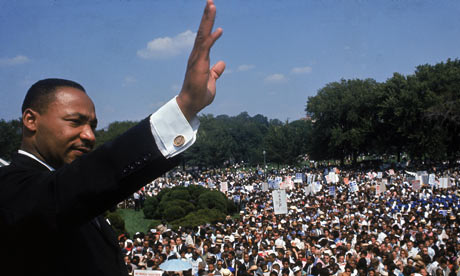 The civil right achievements of Martin Luther King are quite justly the focus of the annual birthday commemoration of his legacy. But it is remarkable, as I've noted before on this holiday, how completely his vehement anti-war advocacy is ignored when commemorating his life (just as his economic views are).
The civil right achievements of Martin Luther King are quite justly the focus of the annual birthday commemoration of his legacy. But it is remarkable, as I've noted before on this holiday, how completely his vehement anti-war advocacy is ignored when commemorating his life (just as his economic views are).
By King's own description, his work against US violence and militarism, not only in Vietnam but generally, was central - indispensable - to his worldview and activism, yet it has been almost completely erased from how he is remembered.
King argued for the centrality of his anti-militarism advocacy most eloquently on April 4, 1967, at Riverside Church in New York City - exactly one year before the day he was murdered. That extraordinary speech was devoted to answering his critics who had been complaining that his anti-war activism was distracting from his civil rights work ("Peace and civil rights don't mix, they say. Aren't you hurting the cause of your people, they ask?").
King, citing seven independent reasons, was adamant that ending US militarism and imperialism was not merely a moral imperative in its own right, but a prerequisite to achieving any meaningful reforms in American domestic life.
In that speech, King called the US government "the greatest purveyor of violence in the world today", as well as the leading exponent of "the deadly Western arrogance that has poisoned the international atmosphere for so long" (is there any surprise this has been whitewashed from his legacy?).
TVNL Comment: King was assassinated almost exactly one year after this speech, yet his anti war statements are never quoted, and his condemnations of US militarism remain buried with thim. Can you doubt for a minute that Martin Luther King, Jr. was silenced by those who did not want him to be heard?





 The first amendment guarantees freedom of speech and freedom of assembly. It will have little meaning...
The first amendment guarantees freedom of speech and freedom of assembly. It will have little meaning... On Monday, August 6, 1945, after six months of intense firebombing of 67 other Japanese cities,...
On Monday, August 6, 1945, after six months of intense firebombing of 67 other Japanese cities,... Later this month, on the holiday of Purim, Jewish people will dress in silly costumes, eat...
Later this month, on the holiday of Purim, Jewish people will dress in silly costumes, eat...






























